The relationship between water quality and the microbial virulome and resistome in urban streams in Brazil
Urban streams in São Paulo, Brazil, have been studied to understand the diversity and composition of aquatic microbial taxa, virulence genes, and antimicrobial resistance determinants. The study found a predominance of Proteobacteria, Actinobacteria, and Bacteroidetes, with Pseudomonas being the most abundant genus. Clinically relevant antimicrobial resistance genes were detected, with β-lactams and macrolide-lincosamide-streptogramin having the highest relative abundances. The study suggests potential consequences for human health as aquatic microbial communities respond to urban outputs.
AMR NEWS
Your Biweekly Source for Global AMR Insights!
Stay informed with the essential newsletter that brings together all the latest One Health news on antimicrobial resistance. Delivered straight to your inbox every two weeks, AMR NEWS provides a curated selection of international insights, key publications, and the latest updates in the fight against AMR.
Don’t miss out on staying ahead in the global AMR movement—subscribe now!






